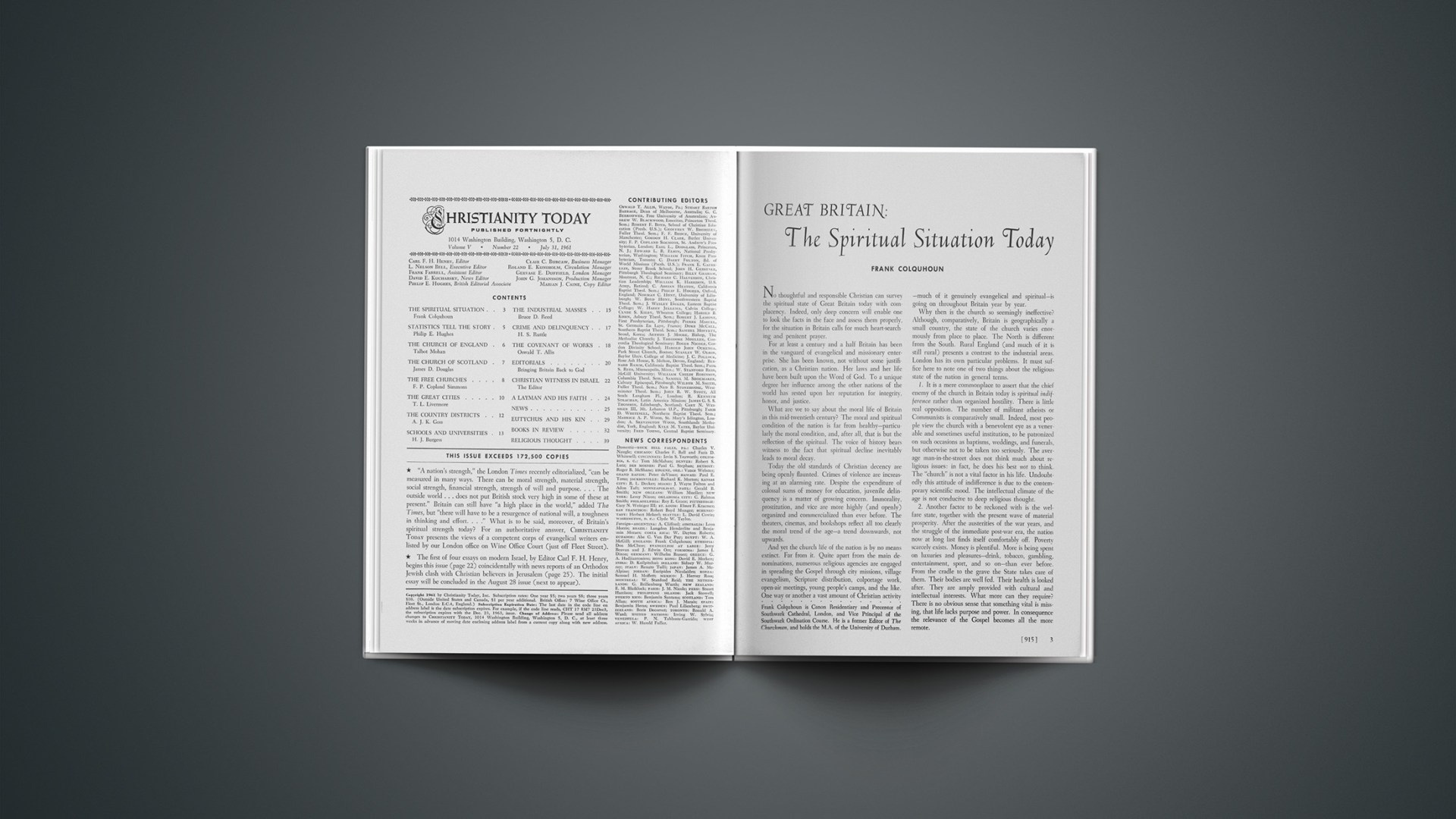No thoughtful and responsible Christian can survey the spiritual state of Great Britain today with complacency. Indeed, only deep concern will enable one to look the facts in the face and assess them properly, for the situation in Britain calls for much heart-searching and penitent prayer.
For at least a century and a half Britain has been in the vanguard of evangelical and missionary enterprise. She has been known, not without some justification, as a Christian nation. Her laws and her life have been built upon the Word of God. To a unique degree her influence among the other nations of the world has rested upon her reputation for integrity, honor, and justice.
What are we to say about the moral life of Britain in this mid-twentieth century? The moral and spiritual condition of the nation is far from healthy—particularly the moral condition, and, after all, that is but the reflection of the spiritual. The voice of history bears witness to the fact that spiritual decline inevitably leads to moral decay.
Today the old standards of Christian decency are being openly flaunted. Crimes of violence are increasing at an alarming rate. Despite the expenditure of colossal sums of money for education, juvenile delinquency is a matter of growing concern. Immorality, prostitution, and vice are more highly (and openly) organized and commercialized than ever before. The theaters, cinemas, and bookshops reflect all too clearly the moral trend of the age—a trend downwards, not upwards.
And yet the church life of the nation is by no means extinct. Far from it. Quite apart from the main denominations, numerous religious agencies are engaged in spreading the Gospel through city missions, village evangelism, Scripture distribution, colportage work, open-air meetings, young people’s camps, and the like. One way or another a vast amount of Christian activity—much of it genuinely evangelical and spiritual—is going on throughout Britain year by year.
Why then is the church so seemingly ineffective? Although, comparatively, Britain is geographically a small country, the state of the church varies enormously from place to place. The North is different from the South. Rural England (and much of it is still rural) presents a contrast to the industrial areas. London has its own particular problems. It must suffice here to note one of two things about the religious state of the nation in general terms.
1. It is a mere commonplace to assert that the chief enemy of the church in Britain today is spiritual indifference rather than organized hostility. There is little real opposition. The number of militant atheists or Communists is comparatively small. Indeed, most people view the church with a benevolent eye as a venerable and sometimes useful institution, to be patronized on such occasions as baptisms, weddings, and funerals, but otherwise not to be taken too seriously. The average man-in-the-street does not think much about religious issues: in fact, he does his best not to think. The “church” is not a vital factor in his life. Undoubtedly this attitude of indifference is due to the contemporary scientific mood. The intellectual climate of the age is not conducive to deep religious thought.
2. Another factor to be reckoned with is the welfare state, together with the present wave of material prosperity. After the austerities of the war years, and the struggle of the immediate post-war era, the nation now at long last finds itself comfortably off. Poverty scarcely exists. Money is plentiful. More is being spent on luxuries and pleasures—drink, tobacco, gambling, entertainment, sport, and so on—than ever before. From the cradle to the grave the State takes care of them. Their bodies are well fed. Their health is looked after. They are amply provided with cultural and intellectual interests. What more can they require? There is no obvious sense that something vital is missing, that life lacks purpose and power. In consequence the relevance of the Gospel becomes all the more remote.
3. Without question, the real cleavage between the church and the nation is at the level of the “working classes” rather than at the other end of the scale. Of course, it is a fact that the working classes historically have been poor churchgoers, and their religion always has been nominal and superstitious rather than active and real. Perhaps the difference today is that their religion is ceasing to be even nominal—at least in many cases—and that this section of the community is more blatantly pagan than any other.
The spiritual situation in Britain is therefore not an easy one. In many respects it is quite complex. Looking at things as a whole, it would be easy to become entirely pessimistic.
SOME SIGNS OF HOPE
It would be equally easy to be deceived by a false optimism. Yet the position is not without hope, particularly from the evangelical point of view.
1. Ever since Billy Graham’s visit to London in the spring of 1954 for the “Harringay” crusade, there has been a quickening of evangelistic concern in the churches and the result in many cases has been an improvement in church attendance. But more—there has also been a notable increase in the number of recruits for the Christian ministry. As a result the supply of ordinands is now better than it has been since before the war, and it is still improving. The significance of this is that, in the opinion of many observers, manpower is the key to the missionary situation facing the church in Britain today. There is evidence that in well-staffed parishes the church is having a definite and decided impact on the community. The ineffective church is usually the church with an ineffective ministry.
2. Another hopeful sign is to be found in the universities and colleges, more especially among the older foundations. It is claimed that church and chapel attendances at Oxford and Cambridge are larger than they have been for several decades. Those engaged in evangelistic and pastoral work among students tell of a quickening of interest in the eternal verities, a deeper spirit of inquiry, a new readiness to consider the claims of Christ—and in many cases to accept them. It seems that the Gospel is making itself felt in a potent way among the future leaders of British public life.
3. Closer co-operation between the churches is another significant mark of the current religious situation in Britain. Slowly the barriers between the established church and the free churches are breaking down. Bitter and jealous rivalry among the denominations is giving way to united endeavor—sometimes in the field of evangelism, sometimes in the sphere of social service. Admittedly visible unity among the churches is not necessarily a mark of grace; but no more is visible disunity. And the latter is all too often a cause of stumbling to those outside who cannot reconcile the church’s message of peace and goodwill with its own deeply divided state. Clearly the church can speak with more authority to a bewildered and questioning society when it speaks with one voice.
4. Much has been made in certain quarters of the post-war revival of “biblical theology” and the return to biblical preaching. There is enough truth in this claim to enable us to speak of a “back to the Bible” movement in the churches. The old era of destructive biblical criticism seems to be a thing of the past. This has not been followed by a wholesale revival of “conservative” theology—not by a long way; but at least the Bible is being taken more seriously than before and is being accorded a new place of honor in the pulpit and lecture hall.
So there are signs of hope. But there is no ground whatever for complacency in looking at the religious life of Britain today. True, a great deal is being done. The disturbing question is: How much is being accomplished? And what is needed to make the Church’s witness more powerful and penetrating in the life of the nation?
There is only one answer to that question. The basic need of the church is for spiritual revival. The machinery is there. The driving force is lacking. Perhaps it would not be unfair to suggest that Christians in Britain, generally speaking, are living on the right side of Easter but on the wrong side of Pentecost. They have faith but not power. And that is true of the church as a whole. A deep religious awakening would change the church in Britain from being a respectable (and often respected) institution into a dynamic (and sometimes disturbing) spiritual force.
Samuel M. Shoemaker is the author of a number of popular books and the gifted Rector of Calvary Episcopal Church in Pittsburgh. He is known for his effective leadership of laymen and his deeply spiritual approach to all vital issues.










